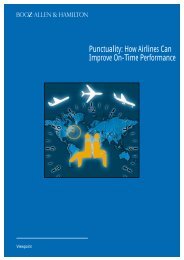The sentence
The sentence
The sentence
You also want an ePaper? Increase the reach of your titles
YUMPU automatically turns print PDFs into web optimized ePapers that Google loves.
Parallel responses: ‘John can …’/ ‘I can, too/So can I’<br />
1. We repeat the auxiliary and if there is no auxiliary, we use do, does or did:<br />
statement parallel response<br />
John can speak French. I can, too. or: So can I.<br />
John can’t speak French. I can’t, either. or: Neither/Nor can I.<br />
John speaks French. I do, too. or: So do I.<br />
John doesn’t speak French. I don’t either. or: Neither/Nor do I.<br />
2. We often say So’m I, Neither’m I, Nor’m I, but we usually write them in full:<br />
So am I, Neither am I, Nor am I. Neither and Nor are exactly the same.<br />
‘So have you’ and ‘So you have!’<br />
Note the difference between:<br />
I’ve got a rash on my arm and so have you. (parallel! Addition)<br />
I’ve got a rash on my arm. – So you have! (confirmation or surprise)<br />
E. Question-word questions (1): ‘Who(m) …?, ‘What …?<br />
Form of question-word questions (except subject questions<br />
<strong>The</strong> word order of questions is: question-word + auxiliary + subject:<br />
statement: He is working. He arrives at 8.<br />
Yes/No question: Is he working? Does he arrive at 8?<br />
Question-word: Why is he wording? When does he arrive?<br />
(Not *Why he is working?*) (Not *When he arrive?*)<br />
‘Who(m) …?’ as a question-word<br />
1. Who(m) …? asks for the object of a <strong>sentence</strong>, usually a person’s name or a pronoun:<br />
statement: Frank met Alice. Question: Who(m) did Frank meet? – Alice.<br />
2. Who(m) …? refers only to people and can be used to ask about masculine, feminine,<br />
singular or plural: Who(m) did you see? – Tim/Ann/<strong>The</strong> Robinsons.<br />
3. We still use Whom …? in formal English, spoken or written, but we often prefer Who …? in<br />
everyday style:<br />
Whom did you meet at the party? (formal) Who did you meet at the party? (informal)<br />
4. We often use Who(m) …? in questions with verbs followed by to or for:<br />
Who(m) did you give it to? Who(m) did you buy it for?<br />
‘What …?’ as a question-word<br />
1. What …? asks for a whole <strong>sentence</strong>: What are you doing: - I’m reading.<br />
Or for the object of a <strong>sentence</strong>: What are you reading? – ‘Gone with the Wind’.<br />
2. What …? also combines with nouns:<br />
What book/books? What boy/boys? What girl/girls?<br />
85




